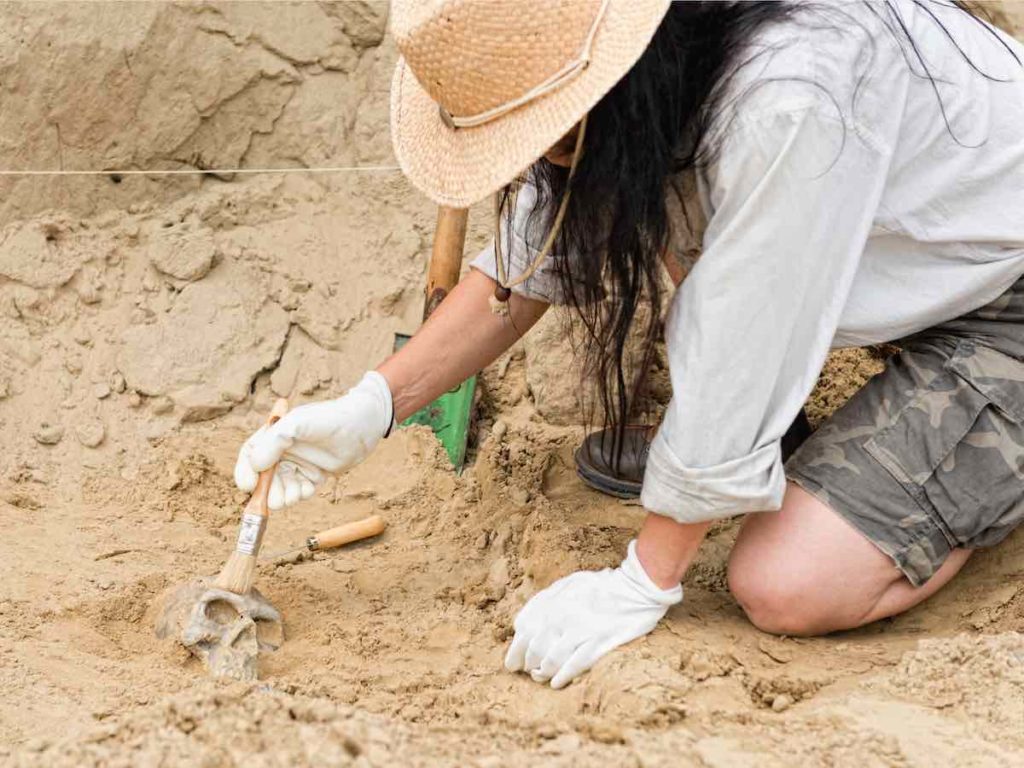Anthropology Major: Good, Hard, High Paying?
You believe that you would make for an excellent anthropologist one day because you have long been fascinated with the origin and development of humans as well as different cultures and archaeological remains.
But will major in anthropology limit you to a single career path only?
Because anthropology is a diverse field that equips degree-seeking students with various soft and hard skills, a bachelor’s degree in it can be applied to many different professions, from research, education, community service to business. Employed individuals with an anthropology degree amount to 3.95 million.
Read on if you are seriously considering earning a bachelor’s degree in anthropology.
In this post, we will talk about some of the most important things every anthropologist wannabes need to know, from what makes anthropology different from archaeology, its difficulty level as a major, colleges and universities offering a good degree program in it to the various jobs waiting for you to grab after graduation.

Anthropology vs. Archaeology: What’s the Difference?
Both anthropology and archaeology are social sciences that study human behavior and culture. While archaeology focuses more on ancient civilizations as well as analyzing artifacts and architectural remnants, anthropology, meanwhile, is more about investigating both historical and contemporary cultures.
It’s true that anthropologists and archaeologists can investigate the same time periods and explore the same types of communities. After all, both branches of science share a common heritage.
However, anthropology and archaeology have separate identities that not too many people are aware of.
Simply put, anthropology is a much broader discipline of study than archaeology. As a matter of fact, in the US, archaeology is considered a sub-field of anthropology — outside the country, however, the two are regarded as separate fields. In any case, the fact remains that there are key things that separate anthropology and archaeology from one another.
One of the things that anthropology and archaeology share is that they both study humans and human cultures. However, they are different when it comes to which ones they study. Anthropology concentrates on prehistoric as well as current societies, while archaeology centers on ancient history.
It’s no secret that archaeologists head to excavation sites armed with spades, shovels, sieves and brushes — it’s a good day for them if they happen to dig up artifacts and ancient structures to analyze and date.
While anthropologists also conduct a lot of fieldwork and are interested in cave paintings, ruins of buildings, tools, pottery and others, they are more involved with investigating ancient human remains, which allows them to determine how individuals from prehistoric societies developed, lived and interacted.
Still, it’s on a case-to-case basis, depending on which sub-field of anthropology is concerned:
Biological anthropology
Also sometimes referred to as physical anthropology, biological anthropology is the study of the evolution as well as physical development of human beings. Basically, it aims to explore and understand the causes of present human diversity. Biological anthropology encompasses many fields, including primate behavior and human genetics.
Cultural anthropology
The study of the learned behavior of people in specific environments — such, in a nutshell, is what cultural anthropology is all about. Known as sociocultural anthropology, too, it aims to identify and explore both commonalities and differences between past and present societies. As the sub-field’s name suggests, it centers on culture.
Linguistic anthropology
Simply put, linguistic anthropology, which is also sometimes referred to as ethnolinguistics, is the study of how language influences social life. It concerns itself with determining the relationship between language and society and culture. Some experts consider linguistic anthropology a branch of linguistics, while others see it as an autonomous field.
Archaeology
Just like what’s mentioned earlier, archaeology is a sub-field of anthropology in the US. What we haven’t mentioned yet is the fact that archaeology comes in many different branches. Some of them include prehistoric, indigenous, biblical, classical, medieval, forensic, urban, maritime, environmental and even digital archaeology.
Is Anthropology Hard in College?
Anthropology is a major that’s not too difficult for degree-seeking students whose passion lies in studying various aspects of humanity. As a matter of fact, it’s ranked #60 out of 124 majors ranked by Big Economics according to difficulty. Anthropology majors usually have to spend 15 hours of study per week.
An undergraduate curriculum in anthropology can vary from school to school or from program to program.
Because of this, an anthropology major at one school or in one program may have to take a different set of core courses than someone at a different school or in another program. But core courses might include the following:
- Cultural anthropology
- Introduction to archaeology
- Human origins and evolution
- Language and culture
- Seminar on the unity of anthropology
- World archaeology
- World ethnography
One of the most exciting things about majoring in anthropology — well, at least for undergraduate students who dream of becoming anthropologists one day — is the fieldwork.
Depending on the school, anthropology majors may travel locally or outside the US to gain field experience.
In some instances, students working on a bachelor’s in anthropology may choose to do humanitarian work in order to fulfill the fieldwork requirement. Usually, they are given the opportunity to work in different non-governmental organizations (NGOs) doing health care provision, poverty alleviation, environmental protection, etc.
What’s really nice about anthropology is that it pairs very well with many different minors. However, if your goal is to increase your knowledge base and skills in a particular anthropology-related field or industry as well as boost your marketability, it’s generally a good idea to opt for a complementary minor.
Here are some of the most popular minors among students enrolled in a bachelor’s program in anthropology:
- Business
- Criminal justice
- Ecology
- Economics
- Education
- Geography
- Geology
- Global health
- Marketing
- Paleontology
- Political science
- Psychology
- Public administration
- Sociology
9 Possible Anthropology Major Careers And Salaries
Majoring in anthropology equips students with a variety of soft and hard skills that make them marketable in today’s tough job market. Individuals with a bachelor’s in anthropology usually take career paths in many fields and industries, from academia, business, community service to governmental positions.
It’s no secret that earning a master’s degree can open doors to more career opportunities, which is why some holders of an undergraduate degree in anthropology attend graduate schools to earn a master’s degree.
However, based on recent data, only 8.41% of all anthropology degrees conferred in the US were master’s.
On the other hand, up to 78% were bachelor’s degrees.
The majority of the social sciences workforce (56.8%) consists of people with bachelor’s in anthropology. So, in other words, anthropology majors are highly employable, with the middle 50% making an average salary ranging from $51,170 to $84,560.
Here are just some of the things you can do with a bachelor’s in anthropology:

Anthropologist
- Median annual salary: $61,910
- Job outlook in 10 years: 7%
First things first: anthropology majors usually end up serving as assistants to anthropologists or fieldworkers. That’s because actual anthropologists need to have at least a master’s in either anthropology or archaeology.
The roles of anthropologists can vary tremendously, depending on where they work or which duties they are tasked with.
For instance, some spend most of their work hours in offices conducting research, while others can be found mostly in laboratories performing studies and analyses. And then there are also those who travel to archaeological sites.
Forensic anthropologist
- Median annual salary: $61,910
- Job outlook in 10 years: 7%
What makes forensic anthropologists different from other forensic experts is that it’s the location and recovery of human remains at crime scenes that they assist law enforcement officers with. Thanks to their strong background in anthropology, forensic anthropologists are the ones authorities rely upon when it comes to excavating buried remains.
Besides the aforementioned tasks, it’s also common for forensic anthropologists to be summoned to appear in courts and explain methods and techniques used as well as provide testimony about their findings.
Museum technician
- Median annual salary: $50,120
- Job outlook in 10 years: 19%
Preparing items for exhibition purposes and putting them back safely into storage afterward — such is the day-to-day activities of museum technicians. Also sometimes called museum preparators or collection specialists, they are primarily responsible for caring and safeguarding the various prized possessions of museums.
It’s important for museum technicians to possess good communication and public speaking skills, too. That’s because, from time to time, they may also have to provide answers to the public as well as visiting professors and scholars.
High school anthropology teacher
- Median annual salary: $61,820
- Job outlook in 10 years: 8%
Teaching anthropology as an elective or Advanced Placement (AP) course can be a totally satisfying job for anthropology majors. It’s for the fact that they get to work in a related field and introduce high schoolers to the discipline — and probably inspire some to enroll in an anthropology program in college, too!
Besides anthropology, it’s not uncommon for anthropology majors working as high school teachers to also teach related subjects, including geography and sociology. Public school anthropology teachers must have a state license.
Social or human service assistants
- Median annual salary: $37,610
- Job outlook in 10 years: 17%
Anthropology majors working as social or human service assistants may not be paid a lot. As a matter of fact, their median annual salary is close to 20% lower than the median annual salary for all occupations ($45,760). However, for those who prioritize making a positive impact on the lives of others, it can be the most rewarding and fulfilling job.
What social or human service assistants do is help communities, families and individuals obtain services in various fields, ranging from rehabilitation to social work. Other than services, they also assist their clients in finding benefits.
Survey researcher
- Median annual salary: $59,740
- Job outlook in 10 years: 4%
The job title makes it clear what survey researchers do: they design and conduct surveys and, afterward, analyze data, too. Many entry-level survey research job positions accept a minimum of a bachelor’s degree.
Most survey researchers work in polling organizations, research agencies, laboratories, non-profits, governmental agencies, and colleges and universities. Those who conduct interviews travel a lot in order to meet with individuals or focus groups. When designing surveys and analyzing collated data, however, survey researchers work in an office setting.
Human resource specialist
- Median annual salary: $62,290
- Job outlook in 10 years: 10%
While agencies that provide recruitment services mostly employ human resource specialists with a bachelor’s in human resources or a closely related field, anthropology majors can be some of the best human resource specialists when it comes to recruiting employees for companies or organizations providing scientific and technical services.
Most of the work hours of human resource specialists are spent in office settings. However, it’s not unlikely for them to travel once in a while to attend job fairs and college activities in order to find recruits.
Market research analyst
- Median annual salary: $63,920
- Job outlook in 10 years: 22%
As a result of having knowledge of human behavior as well as how societies function, anthropology majors can prove to be effective as market research analysts for various industries. Some common examples include research organizations, consulting firms, non-profits, wholesale trades, publishing houses and governmental agencies.
Obtaining the Professional Researcher Certification (PRC) allows market research analysts to demonstrate proficiency. In order to be eligible, they must complete minimum work experience requirements and take and pass an exam.

Anthropological writer
- Median annual salary: $69,510
- Job outlook in 10 years: 9%
For bachelor’s in anthropology holders with superb research, organizational, writing and editing skills, anthropological writing is a wonderful career option for them. As such, they have the great opportunity to communicate findings, share new insights with the world and tell human experience-related stories that matter.
What’s so nice about being anthropological writers is that anthropology majors can choose from many different writing genres, ranging from creative non-fiction, memoirs, travel to journalism.
Best Schools for Anthropology
Unfortunately for students from low-income backgrounds, the vast majority of the top colleges and universities with top-notch degree programs in anthropology are prestigious ones, which means steeper sticker prices.
But the good news is that you can always fill out the FAFSA in order to obtain financial aid.
Without further ado, the following are some of the institutions that you might want to include on your college list if it’s the best bachelor’s degree in anthropology you want to have:
| INSTITUTION | ESTIMATED COA |
| Harvard University | $75,891 |
| Yale University | $79,370 |
| Stanford University | $78,218 |
| Dartmouth College | $80,184 |
| Princeton University | $68,044 |
| Duke University | $77,069 |
| Washington University in St. Louis | $79,586 |
| University of Chicago | $81,531 |
| University of Pennsylvania | $81,110 |
| Rice University | $69,557 |
| Columbia University | $77,603 |
| Vanderbilt University | $76,044 |
| Cornell University | $78,992 |
| Tufts University | $79,000 |
| Northwestern University | $81,283 |
| University of Notre Dame | $76,883 |
| Brown University | $80,448 |
| Johns Hopkins University | $67,667 |
| University of Michigan – Ann Arbor | $31,484 (in-state) and $67,802 (out-of-state) |
| University of California – Los Angeles | $36,787 (in-state) and $66,541 (out-of-state) |
| University of California – Berkeley | $41,528 (in-state) and $71,282 (out-of-state) |
| University of Virginia | $35,664 (in-state) and $68,865 (out-of-state) |
| University of Florida | $21,431 (in-state) and $42,648 (out-of-state) |
| University of North Carolina at Chapel Hill | $24,546 (in-state) and $51,725 (out-of-state) |
| College of William & Mary | $40,034 (in-state) and $62,689 (out-of-state) |
Best Online Universities for Anthropology
Many US colleges and universities with online campuses also offer a bachelor’s program in anthropology, which is ideal for non-traditional students like working professionals, parents and those with physical disabilities to earn.
It’s also suited for low-income students as online degrees are generally cheaper due to the elimination of some college-related costs.
Below, you will come across some of the best online schools that are fully legitimate and accredited — you can rest assured that the degree in anthropology you will earn from any one of them has value.
University of Florida
- Location: Gainesville, Florida
- Cost: $129.18 (in-state) and $552.62 (out-of-state) per credit hour
- Accreditor: Southern Association of Colleges and Schools Commission on Colleges (SACSCOC)
- Acceptance rate: 31%
- Average starting salary: $47,000 per year
University of Central Florida
- Location: Orlando, Florida
- Cost: $179.19 (in-state) and $715.80 (out-of-state) per credit hour
- Accreditor: Southern Association of Colleges and Schools Commission on Colleges (SACSCOC)
- Acceptance rate: 45%
- Average starting salary: $37,600 per year
Arizona State University
- Location: Tempe, Arizona
- Cost: $552.00 (in-state and out-of-state) per credit hour
- Accreditor: New England Commission of Higher Education (NECHE)
- Acceptance rate: 88%
- Average starting salary: $34,000 per year
Oregon State University
- Location: Corvallis, Oregon
- Cost: $346.00 (in-state and out-of-state) per credit hour
- Accreditor: Northwest Commission on Colleges and Universities (NWCCU)
- Acceptance rate: 82%
- Average starting salary: $40,000 per year
University of Houston
- Location: Houston, Texas
- Cost: $245.75 (in-state) and $653.75 (out-of-state) per credit hour
- Accreditor: Southern Association of Colleges and Schools Commission on Colleges (SACSCOC)
- Acceptance rate: 63%
- Average starting salary: $45,500 per year
Just Before You Enroll in an Anthropology Program
Refrain from assuming that majoring in anthropology will leave you in a career of constantly digging for artifacts and human remains or constantly studying the evolution of human behavior and culture from start to finish — although that shouldn’t be a problem if it’s something you’re really passionate about.
Thanks to the many soft and hard skills an undergraduate degree program in anthropology will equip you with, you can choose from an array of career options or attend graduate school to further your studies.
Read Next: Music Major: Good, Hard, Employable?
Disclaimer: The views and opinions expressed in this article are those of the authors and do not necessarily represent those of the College Reality Check.





